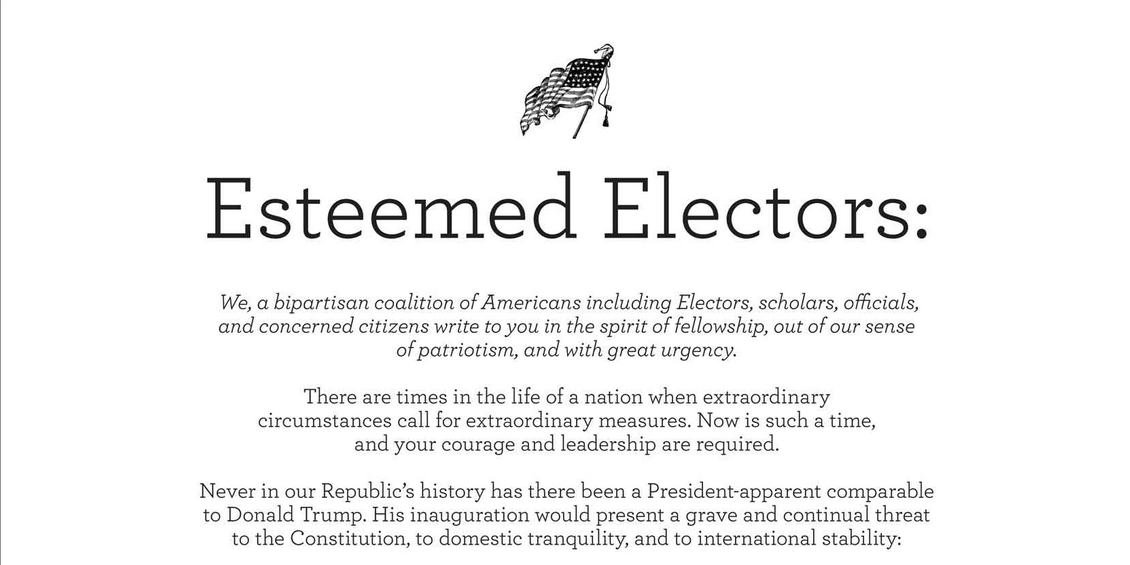The Vote Is Days Away — Where Does the Electoral College Stand?
By:
With just days to go until Electoral College members meet in their state capitols to cast the final vote for President of the United States, the group is sparking more conversation than at any time since the Constitutional Convention itself.
As it stands, Donald Trump leads Hillary Clinton 306-232. While this is far from the "landslide" Trump staffers are claiming he won, it's a comfortable enough lead to ensure that Trump will be formally and finally elected President on December 19.
But this hasn't stopped people from trying to disrupt the process. Indeed, electors have been deluged with calls, emails, and celebrity studded social media messages attempting to sway their vote, like this one posted by the "multi-partisan movement" Unite for America.
Shortly after the election, a movement of self-styled "Hamilton Electors" was founded, vowing to vote for a moderate Republican, and attempting to sway others to do the same. It should be noted that while the Hamilton Electors claim to have 21 members on their side, only Texas elector Chris Suprun in the only Republican in the bunch.
The lack of public support hasn't stopped both sides from pressing the debate as to what advocacy role the Electoral College should have on Monday.
On one side are Democrats desperate for an eleventh hour, fifty-ninth minute rebuke of Trump. Democratic activist Daniel Brezenoff set up a crowd-funding page that raised a quarter of a million dollars to fund a full page open letter that he unveiled on Wednesday.
 Daniel Brezenoff
Daniel Brezenoff
Taken out in the Washington Post, as well as papers in Philadelphia, Austin, Salt Lake City, Tampa Bay, and Atlanta; the letter is targeted to Republican electors and labels Trump "a grave and continual threat to the Constitution" while running down a litany of accusations against him. The letter is signed by three electors (all Democrats) as well as luminaries in law, civil liberties, history, and public policy.
At the same time as activists are trying to sway electors, Harvard-based constitutional law professor Larry Lessig (who was also a presidential candidate for a few weeks) has claimed that their efforts might be working.
A few days ago, Lessig, who had offered pro bono legal advice to electors thinking of breaking away from their state's vote, claimed he knew of as many as 20 Republicans considering not voting for Trump.
"[W]hether an elector ultimately votes his or her conscience will depend in part upon whether there are enough doing the same. We now believe there are more than half the number needed to change the result seriously considering making that vote,” Lessig told Politico. He offered no evidence to support this claim, nor did he give the names of potential faithless electors.
The efforts to sway Trump electors aren't going unnoticed. Politico reported that the RNC has coordinated with state parties and Trump officials to take a whip count of Republican elector intentions, and found that Texas' Suprun was the only one at risk of voting against Trump. Even electors who heavily criticized Trump appear to be willing to fall in line.
An extensive report from the Associate Press echoes this. The AP interviewed over 330 electors, finding that not a single Republican they spoke to planned to change their vote.
It is possible that potential faithless electors might be keeping their intentions under wraps for fear of antagonizing Trump voters. Indeed, Suprun has faced harassment and conservative blogs digging into his past.
But it's more likely that electors, who were chosen almost entirely because of their loyalty to the party, will do their duty to that party, even if they have reservations about it.
